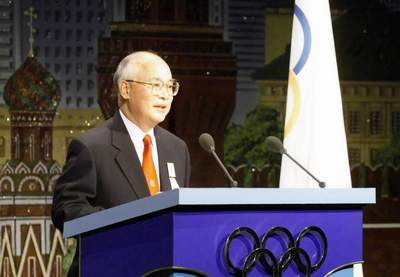The International Olympic Committee (IOC) awarded the
2008 Olympic Games to Beijing, which won a 56 majority out of the 105 IOC
members who voted on Jul. 13, 2001, beating bids from Toronto, Paris, Istanbul
and Osaka.

IOC executive board
member He Zhenliang made a speech to bid for the 2008 Olympic Games on
Jul. 13, 2001.[filephoto] |
To most IOC members, Beijing's case for the Games was simple: China is home
to a one-fifth of the world's population but has never hosted the Olympics. It
is a largely untapped market for corporate sponsors, and it is also an
international sports giant, finishing third in total medals at the 2000 Sydney
Games.
Australian IOC vice president Gosper said 71-year-old IOC executive board
member He Zhenliang played an important role in bringing the Olympics to
Beijing.
While Dick Pound, the most powerful Canadian on the IOC, had kept the Toronto
bid at a distance, He had been rallying support for the Beijing bid.
IOC first vice president Anita Defrantz of the United States told reporters
that she was moved by He's sincerity and professionalism.
Beijing's low-key tactics before the final vote also paid off. "Toronto put
up an aggressive campaign before the final ballot while Beijing had said less
and done more," said an anonymous Asian IOC member.
Beijing gained a clear lead over its close rivals in the IOC's May 15
evaluation report, and it never relinquished it. The IOC report noted that
Beijing, Toronto and Paris offered "excellent bids" but pointed out a Beijing
Games would "leave a unique legacy to China and to sport."
IOC vice president Kevan Gosper said most members saw the Beijing Games as an
historic event and a catalyst for faster reform in China.
The Chinese capital submitted a solid bid that had the full backing of the
Chinese government and its people. Beijing enjoyed the most support among the
five bidding cities. A Gallup opinion poll commissioned by the Chinese
government showed 94.9 per cent of the public in favor of it. The IOC's own
surveys found even higher support.
Walter said he was "impressed" with Beijing's presentation and Diack said in
a prepared statement that he was convinced Beijing would hold a "magnificent"
Games.
"Beijing established why having the Games was so important to them,
their presentation pushed all the right buttons," Walter said.
Under the motto "New Beijing, Great Olympics", the capital promises to host a
Green, High-tech Olympics, and People's Olympics.
The Chinese government has followed through on their promise to spend what is
necessary to build Olympic-standard facilities in Beijing. It has pledged to
spend US$20 billion in building sports complexes and refurbishing Beijing's
infrastructure.
There are plans for a new exhibition center with twin skyscrapers that will
be taller than any others in the world.
About US$3.7 billion is earmarked for easing traffic congestion, tripling the
length of the city's highways and quadrupling the capacity of its subway system.
In addition, about US$400 million has been earmarked to upgrade the health
care system and city officials want to pour another US$400 million into
communications and technology infrastructure.